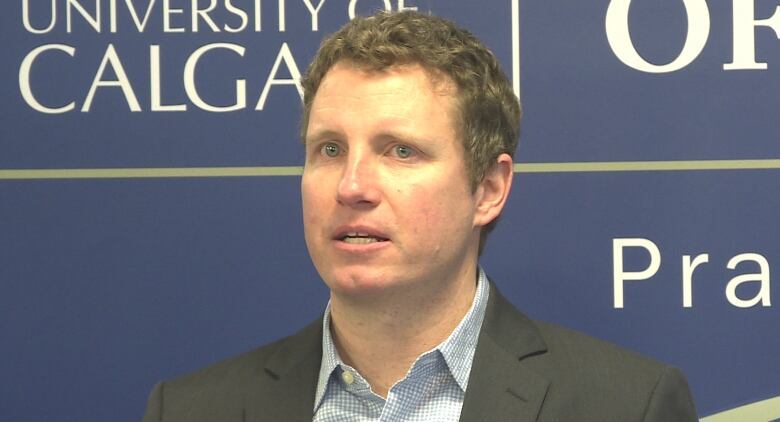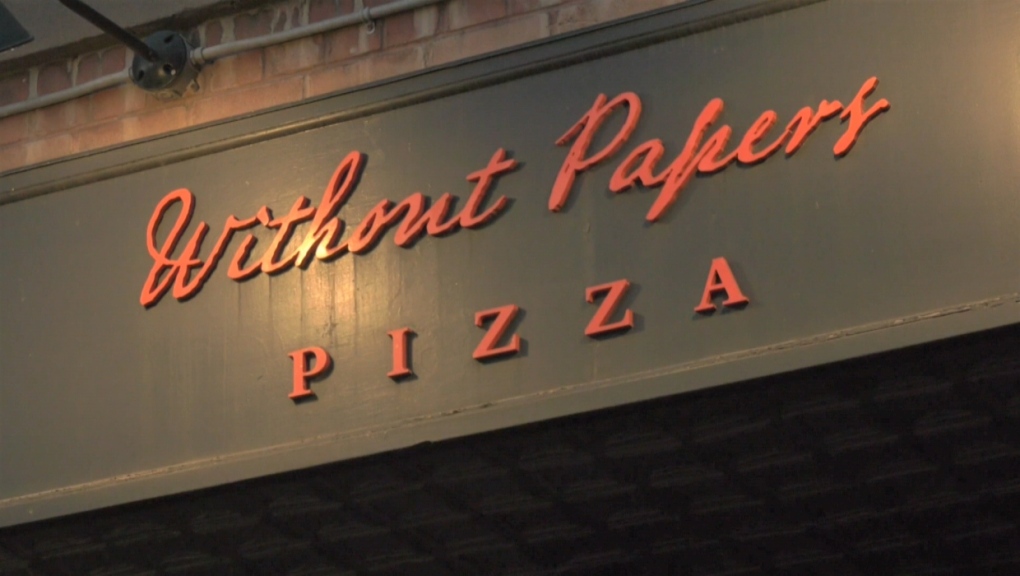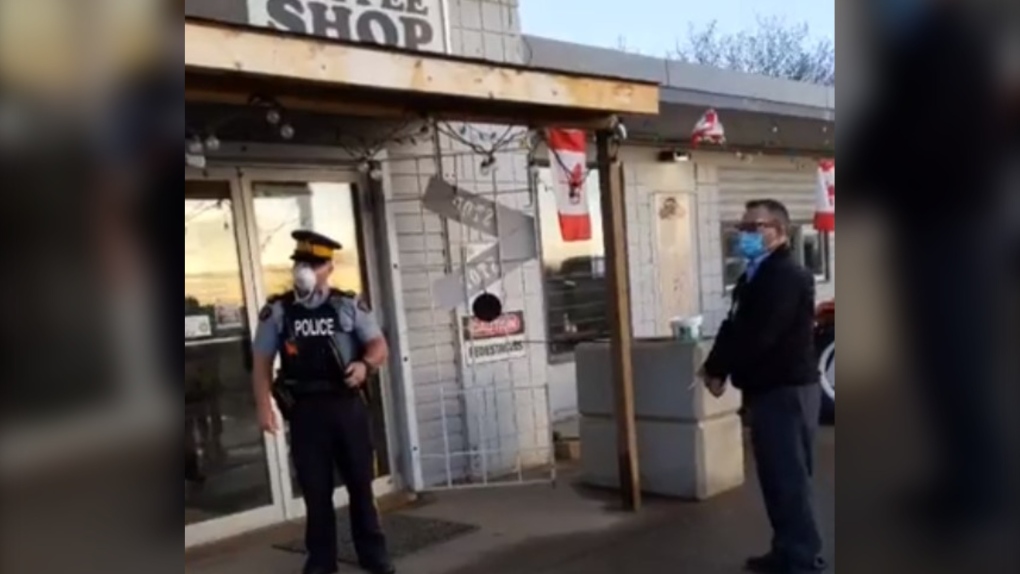https://www.cbc.ca/news/canada/calgary/analysis-albertans-unvaccinated-frustration-covid-1.6215314

Brooks DeCillia · for CBC News · Posted: Oct 20, 2021 3:00 AM MT | Last Updated: 39 minutes ago

According to a CBC News poll, nine per cent of Albertans say they have no intention to get vaccinated against COVID-19. (Reuters)
162
Dr. Daisy Fung finds it hard to measure time these days. She just keeps working until she's done.
Amidst the fourth wave of the novel coronavirus pandemic, the Edmonton family doctor works "killer hours," treating patients, even visiting some of her palliative, geriatric and house-bound patients in their homes.
"Everything during COVID just seems to take a lot longer," adds Fung, an assistant clinical professor in the department of family medicine at the University of Alberta.
She recently spent two hours talking with a patient hesitant to get a COVID-19 inoculation.
"Drawing empathy has been harder and harder in general during this pandemic for patients," concedes Dr. Fung.
While she inevitably finds understanding for her patients, she struggles to identify with some people.
"It's especially frustrating when in my personal life, I see people who are suffering from COVID or have lost both parents to COVID … [and] they're not vaccinated and they're spreading misinformation."
And Dr. Fung is not alone.
Like the static crackle of electronic noise, an acrimonious current animates social media discussions about Alberta's seemingly interminable COVID-19 situation.
As the provincial government and medical professionals continue to implore Albertans to get vaccinated, the white noise of angry posts, tweets and memes about what for some can feel like a never-ending pandemic pile on top of each other in the forums.
This can lead to anger with each other, and with the provincial government.
According to a new poll conducted for CBC News, anger and frustration top the list of feelings Albertans have when asked about unvaccinated people.

Dr. Daisy Fung is an assistant clinical professor in the department of family medicine at the University of Alberta. (Daisy Fung/Facebook)
Forty-three per cent feel frustrated.
The random survey of Albertans also found that 22 per cent of people in the province express understanding, while only one in 10 people say they are indifferent about people who are not yet vaccinated.
One per cent of Albertans say they are not sure regarding how they feel about those who haven't gotten their COVID-19 jabs yet.
"People gravitated towards the very strong words," said Calgary-based pollster Janet Brown, who conducted the survey research for CBC News.
According to the survey, anger and frustration is more pronounced amongst women, urban dwellers, the retired and more educated Albertans. Plus, people who say they are very or somewhat stressed by COVID-19 are also likely to express frustration and anger about the unvaccinated. And stress levels have grown over the course of the pandemic.
"Over the last few months, there's been so much commentary about how divided we are as a population, how polarized we are as a population," adds Brown, stressing that two-thirds of Albertans appear united by their exasperation with the unvaccinated.
But division that creates bonds can lead to a kind of consensus.
"As a pollster, I regularly get results that are 55 to 45 per cent or 52 to 48 per cent.… I wouldn't describe the population as polarized at all. I think there's a strong consensus in the province."
But where does that get us?
According to the CBC News poll, nine per cent of Albertans say they have no intention to get vaccinated. It also found that two per cent of Albertans are not sure about their vaccine intentions, and another two per cent say they can't be vaccinated for medical reasons.
Despite the mounting death toll, the burden on ICUs, and the number of cancelled surgeries, about 13 per cent of Albertans likely won't get vaccinated.
Myles Leslie, with the University of Calgary's School of Public Policy, sympathizes with the anger and frustration many Albertans have for the unvaccinated.

Medical sociologist Myles Leslie with the University of Calgary’s School of Public Policy says he sympathizes with the anger and frustration many Albertans have for the unvaccinated. (Julien Lecacheur/CBC)
"I totally get where it comes from," says the associate professor, who studies vaccine hesitancy.
"But what are we going to do with it?" he wonders.
Empathy and compassion is a good starting point in any quest to convince people to get vaccinated.
Whether you are pro- or anti-vaccine, Leslie encourages Albertans to move beyond labelling each other as "malthinking morons from somewhere over there."
"You want to channel that energy, that anger, that frustration into a productive conversation, rather than a Twitter-style shouting match," says Leslie.
Recent research into persuading reluctant people to get the COVID-19 jab concluded that confrontation with facts and/or scare tactics provoke more resistance.
Leslie's own work highlights the importance of discovering "a vaccine-hesitant person's positive motivation," because getting vaccine hesitant people to say yes to an inoculation requires lengthy empathetic conversations to find out why the person is hesitant.
"You have to be empathetic, actually get into their worldview," said Leslie.
These world views are hard wired, stresses Leslie.
With the rise of the atomized person came personal responsibility. People became liable for their own safety and security.
"We were all little individual risk managers," said Leslie, meaning we all have to plan appropriately, for instance, for our health and retirement.
In this way, the individualism of some can arrive at odds with others. In particular, those Albertans who have adopted a more collectivist worldview during this pandemic.
"That seems to be the fissure that seems to be opening up in Alberta politics," said pollster Janet Brown, "whether people take a collective communal approach to public policy, or whether they take an individualistic approach."
But whatever their approach, many Albertans are united in their disapproval of the UCP's management of COVID-19.
A whopping 70 per cent of Albertans strongly or somewhat approved of the provincial government's management of the pandemic in May of 2020.
Fast forward a year and a half and the governing UCP — mired in controversy and internal infighting — gets high marks from only 20 per cent of Albertans.
Nearly eight in 10 (78 per cent) of Albertans somewhat or strongly disapprove of the UCP's handing of COVID-19, according to the latest CBC News poll.
Albertans gave higher markers to both their municipal and federal levels of government for managing the pandemic.
Premier Jason Kenney promised Albertans the "best summer ever." Experts questioned what they called the government's risky reopening plan based on wishful optimism. And a fourth wave followed in the fall.
Brown thinks the UCP's erratic response to the pandemic has undermined public confidence in its management of the crisis.
"I think it's a factor of the government changing its mind too many times in the course of the pandemic, and … I think it's also the government being quiet at the very times when people want to hear from it the most," said Brown.
The public's dissatisfaction could prove fatal for a government hoping to get re-elected in the spring of 2023.
"With so many people being dissatisfied with the government's handling of the single most important issue in the province," said Brown, "this is a very big hole for this government to dig itself out of."
But the polling data on anger and frustration toward the unvaccinated could provide the UCP with some leverage. Brown thinks the UCP could interpret it as a licence to impose tougher public health measures.
"I think the public is giving the government a mandate to make some of the tough choices that need to be made around mandatory vaccinations, mandatory restrictions and do whatever they can do to get a quick end to this pandemic."
Meanwhile, medical professionals and the provincial government will continue the slow, painstaking work of trying to convince the unvaccinated to get a COVID-19 inoculation.
Empathy goes a long way, says Dr. Fung, recalling her recent two-hour conversation with with a patient who was nearly incapacitated by the fear of getting the vaccine.
Scare tactics and facts don't win the argument, but listening to the patient can work.
"When you truly listen to that and hear that and feel that palpable fear, you can draw empathy from that," said Fung.
Many Albertans are frustrated and angry with the unvaccinated, but what to do with those feelings?
Poll finds two-thirds of Albertans angry or frustrated with the unvaccinated

Brooks DeCillia · for CBC News · Posted: Oct 20, 2021 3:00 AM MT | Last Updated: 39 minutes ago
According to a CBC News poll, nine per cent of Albertans say they have no intention to get vaccinated against COVID-19. (Reuters)
162
Dr. Daisy Fung finds it hard to measure time these days. She just keeps working until she's done.
Amidst the fourth wave of the novel coronavirus pandemic, the Edmonton family doctor works "killer hours," treating patients, even visiting some of her palliative, geriatric and house-bound patients in their homes.
"Everything during COVID just seems to take a lot longer," adds Fung, an assistant clinical professor in the department of family medicine at the University of Alberta.
She recently spent two hours talking with a patient hesitant to get a COVID-19 inoculation.
"Drawing empathy has been harder and harder in general during this pandemic for patients," concedes Dr. Fung.
While she inevitably finds understanding for her patients, she struggles to identify with some people.
"It's especially frustrating when in my personal life, I see people who are suffering from COVID or have lost both parents to COVID … [and] they're not vaccinated and they're spreading misinformation."
And Dr. Fung is not alone.
Like the static crackle of electronic noise, an acrimonious current animates social media discussions about Alberta's seemingly interminable COVID-19 situation.
As the provincial government and medical professionals continue to implore Albertans to get vaccinated, the white noise of angry posts, tweets and memes about what for some can feel like a never-ending pandemic pile on top of each other in the forums.
This can lead to anger with each other, and with the provincial government.
According to a new poll conducted for CBC News, anger and frustration top the list of feelings Albertans have when asked about unvaccinated people.

Dr. Daisy Fung is an assistant clinical professor in the department of family medicine at the University of Alberta. (Daisy Fung/Facebook)
Feelings about the unvaccinated and COVID-19
Almost a quarter (23 per cent) of people in Alberta say they are angry with the unvaccinated.Forty-three per cent feel frustrated.
The random survey of Albertans also found that 22 per cent of people in the province express understanding, while only one in 10 people say they are indifferent about people who are not yet vaccinated.
One per cent of Albertans say they are not sure regarding how they feel about those who haven't gotten their COVID-19 jabs yet.
"People gravitated towards the very strong words," said Calgary-based pollster Janet Brown, who conducted the survey research for CBC News.
According to the survey, anger and frustration is more pronounced amongst women, urban dwellers, the retired and more educated Albertans. Plus, people who say they are very or somewhat stressed by COVID-19 are also likely to express frustration and anger about the unvaccinated. And stress levels have grown over the course of the pandemic.
"Over the last few months, there's been so much commentary about how divided we are as a population, how polarized we are as a population," adds Brown, stressing that two-thirds of Albertans appear united by their exasperation with the unvaccinated.
But division that creates bonds can lead to a kind of consensus.
"As a pollster, I regularly get results that are 55 to 45 per cent or 52 to 48 per cent.… I wouldn't describe the population as polarized at all. I think there's a strong consensus in the province."
But where does that get us?
What are we going to do with it?
According to provincial data, slightly more than three-quarters of Albertans 12+ are already fully vaccinated.According to the CBC News poll, nine per cent of Albertans say they have no intention to get vaccinated. It also found that two per cent of Albertans are not sure about their vaccine intentions, and another two per cent say they can't be vaccinated for medical reasons.
Despite the mounting death toll, the burden on ICUs, and the number of cancelled surgeries, about 13 per cent of Albertans likely won't get vaccinated.
Myles Leslie, with the University of Calgary's School of Public Policy, sympathizes with the anger and frustration many Albertans have for the unvaccinated.

Medical sociologist Myles Leslie with the University of Calgary’s School of Public Policy says he sympathizes with the anger and frustration many Albertans have for the unvaccinated. (Julien Lecacheur/CBC)
"I totally get where it comes from," says the associate professor, who studies vaccine hesitancy.
"But what are we going to do with it?" he wonders.
Empathy and compassion is a good starting point in any quest to convince people to get vaccinated.
Whether you are pro- or anti-vaccine, Leslie encourages Albertans to move beyond labelling each other as "malthinking morons from somewhere over there."
"You want to channel that energy, that anger, that frustration into a productive conversation, rather than a Twitter-style shouting match," says Leslie.
Recent research into persuading reluctant people to get the COVID-19 jab concluded that confrontation with facts and/or scare tactics provoke more resistance.
Leslie's own work highlights the importance of discovering "a vaccine-hesitant person's positive motivation," because getting vaccine hesitant people to say yes to an inoculation requires lengthy empathetic conversations to find out why the person is hesitant.
"You have to be empathetic, actually get into their worldview," said Leslie.
These world views are hard wired, stresses Leslie.
The individualized roots of vaccine hesitancy
The individual — and individual rights — have gained prominence in recent decades.With the rise of the atomized person came personal responsibility. People became liable for their own safety and security.
"We were all little individual risk managers," said Leslie, meaning we all have to plan appropriately, for instance, for our health and retirement.
In this way, the individualism of some can arrive at odds with others. In particular, those Albertans who have adopted a more collectivist worldview during this pandemic.
- DATA
Here are the latest COVID-19 statistics for Alberta — and what they mean - THE LATEST
Everything you need to know about COVID-19 in Alberta on Tuesday, Oct. 19
"That seems to be the fissure that seems to be opening up in Alberta politics," said pollster Janet Brown, "whether people take a collective communal approach to public policy, or whether they take an individualistic approach."
But whatever their approach, many Albertans are united in their disapproval of the UCP's management of COVID-19.
Public attitudes about government handling of pandemic
At the onset of the pandemic, Albertans' trust in experts rose.A whopping 70 per cent of Albertans strongly or somewhat approved of the provincial government's management of the pandemic in May of 2020.
Fast forward a year and a half and the governing UCP — mired in controversy and internal infighting — gets high marks from only 20 per cent of Albertans.
Nearly eight in 10 (78 per cent) of Albertans somewhat or strongly disapprove of the UCP's handing of COVID-19, according to the latest CBC News poll.
Albertans gave higher markers to both their municipal and federal levels of government for managing the pandemic.
Premier Jason Kenney promised Albertans the "best summer ever." Experts questioned what they called the government's risky reopening plan based on wishful optimism. And a fourth wave followed in the fall.
Brown thinks the UCP's erratic response to the pandemic has undermined public confidence in its management of the crisis.
"I think it's a factor of the government changing its mind too many times in the course of the pandemic, and … I think it's also the government being quiet at the very times when people want to hear from it the most," said Brown.
The public's dissatisfaction could prove fatal for a government hoping to get re-elected in the spring of 2023.
"With so many people being dissatisfied with the government's handling of the single most important issue in the province," said Brown, "this is a very big hole for this government to dig itself out of."
But the polling data on anger and frustration toward the unvaccinated could provide the UCP with some leverage. Brown thinks the UCP could interpret it as a licence to impose tougher public health measures.
"I think the public is giving the government a mandate to make some of the tough choices that need to be made around mandatory vaccinations, mandatory restrictions and do whatever they can do to get a quick end to this pandemic."
Meanwhile, medical professionals and the provincial government will continue the slow, painstaking work of trying to convince the unvaccinated to get a COVID-19 inoculation.
Motivating the vaccine hesitant one patient at a time
For the foreseeable future, Dr. Daisy Fung will likely continue to work long hours.Empathy goes a long way, says Dr. Fung, recalling her recent two-hour conversation with with a patient who was nearly incapacitated by the fear of getting the vaccine.
Scare tactics and facts don't win the argument, but listening to the patient can work.
"When you truly listen to that and hear that and feel that palpable fear, you can draw empathy from that," said Fung.





